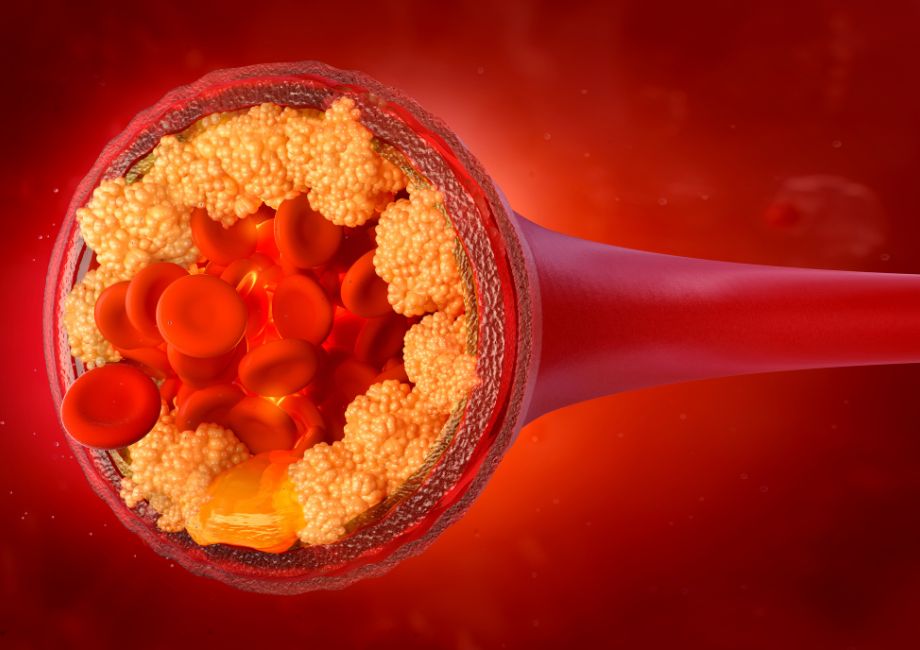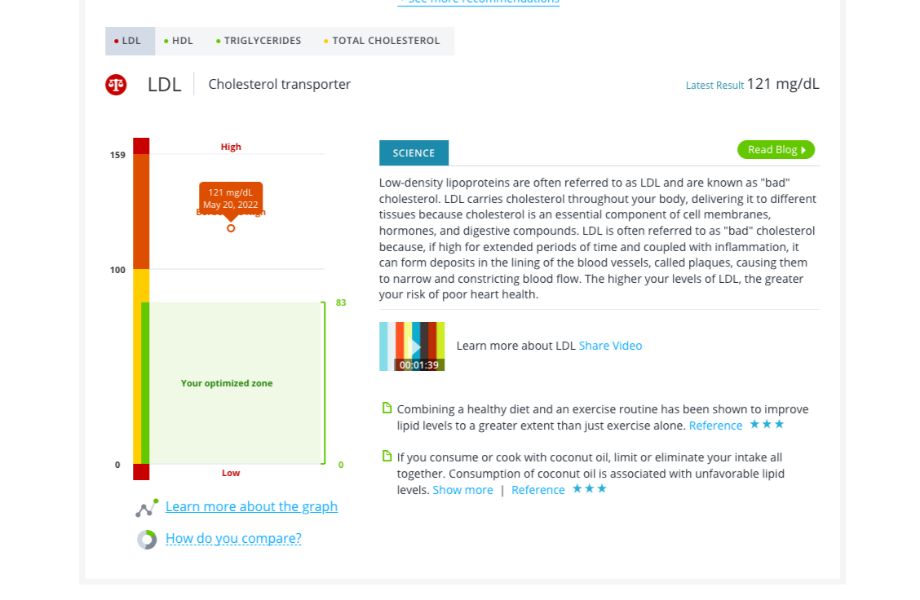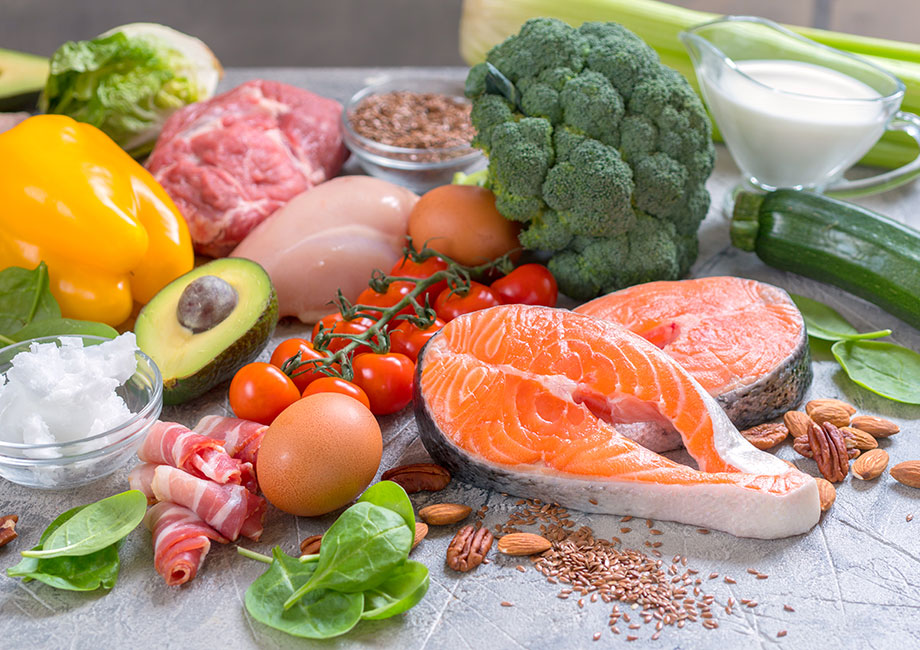We test and review fitness products based on an independent, multi-point methodology. If you use our links to purchase something, we may earn a commission. Read our disclosures.
What is LDL? If you find yourself asking this question, you’re not alone. This biological compound has been making a new appearance in the media lately with the rise of unconventional, high-fat diets like keto, paleo, and carnivore. As a result, many are taking a fresh look at the foods that influence heart health and cholesterol levels.
RELATED: Best Heart Healthy Meal Delivery Services
“Cholesterol” in general is a word that has a negative connotation, but there are different types of cholesterol in the body. Generally speaking, the body needs cholesterol to be present in some amounts. However, there’s a big difference between dietary cholesterol and the types of cholesterol floating around in our blood.
Why is this stuff important to know in the first place? Approximately 13% of all deaths worldwide are caused by ischaemic heart disease, making it the world’s leading cause of death1. Thus, it’s paramount for people to understand the risk factors for developing heart disease and what is in our power to prevent the condition.
Medical disclaimer: This article is intended for educational and informational purposes only. It is not intended as a substitute for medical advice. For health advice, contact a licensed healthcare provider.
What Is LDL?
In the blood, there are things called lipoproteins, named for their combination of lipids (fats) and proteins. The proteins act as a carrier for the fats in the form of lipoproteins to take the fats where they need to go. For this context, cholesterol is a type of fat carried through the blood by one of two types of lipoproteins: LDL (low-density lipoprotein) and HDL (high-density lipoprotein).
Though these types of lipoproteins seem very similar, the distinction between them is critical. LDL cholesterol is considered the “bad” cholesterol and HDL is what we call the “good” cholesterol. For this reason, you want your levels of LDL cholesterol to be as low as possible for optimal heart health.
Why Is LDL Considered the “Bad” Cholesterol?
Even though we normally hear the word “cholesterol” in a negative context, our bodies actually need cholesterol to maintain certain processes. Cholesterol helps the liver produce bile so you can digest dietary fats properly, it plays a key role in producing sex hormones, and it helps to maintain the integrity of cell walls. Can you see how this topic can get confusing?
RELATED: Best Heart Rate Monitors
So, let’s talk LDL. When LDL cholesterol builds up in the arteries, it can begin to stick to your blood vessels and, eventually, harden. This is when plaque forms. If there is enough plaque buildup on the walls of your blood vessels, the blood vessels begin to grow more and more narrow, causing a condition called atherosclerosis.

This gives blood flow less and less space to move freely—sort of like a traffic jam on the freeway. This is called coronary artery disease. When this happens, the heart has to work significantly harder to get the blood to circulate to all of your organs efficiently and return back to the heart.
This is one of the causes of high blood pressure, which creates a higher risk for more serious heart problems like stroke, heart attack, and even kidney damage resulting in chronic kidney disease. It can also cause peripheral artery disease. Peripheral artery disease occurs when the arteries become so narrow that blood flow is blocked to certain extremities. This condition can result in pain and even limb loss.
Now, the heart also is a muscle. Just like any other muscle, it gets fatigued if pushed past its limits, which can result in chest pain. Obviously, this isn’t a good sign. If the plaque buildup becomes bad enough, it can cause a full-on blockage and prevent any blood from passing through. This is when a heart attack happens. It deprives the heart of oxygen which, as you can imagine, is an immediate medical emergency.
Now for some good news. HDL cholesterol is the “good” cholesterol because its high density prevents it from sticking to arteries. Instead, HDL picks up the excess cholesterol in the blood and takes it to the liver, where it can be excreted from the body. HDL cholesterol helps to lower LDL and keep it from building up and creating the disaster we just described. So, if your HDL cholesterol levels are high and your LDL is low, you’re likely in good shape.
What Is the Normal Range of LDL Cholesterol?
Cholesterol numbers are measured by mg/dL (milligrams per deciliter) or how many milligrams of the fats are present for every deciliter of blood. Optimally, you want the amount of cholesterol coming from LDL to be less than 100 mg/dL. Outside of this, these are the standards of test results used by the American Heart Association2:
- 100-129 mg/dL: Borderline optimal
- 130-159 mg/dL: Borderline high
- 160-189 mg/dL: High
- 190 mg/dL and above: Very high
RELATED: Is Pre-Workout Bad For Your Heart?
What Causes High LDL Cholesterol?
Several factors can cause the buildup of too much LDL cholesterol, some of which are out of your control. The good news is that the things that are in your control, like certain lifestyle changes, can often have a large enough impact to override the uncontrollable factors.
Uncontrollable Factors
- Age: Imagine a car with a lot of miles. (Are you loving these auto metaphors?) Inevitably, certain parts won’t work in the same capacity as when the car was brand new. The body is the same—the processes we have in place to clear cholesterol from the blood become less and less efficient as we get older, even if we live the same lifestyle.
- Genetics: You’re more likely to have high cholesterol if you have a family history of cardiovascular disease. There is even a rare condition called familial hypercholesterolemia in which you can have high cholesterol even at a very young age. You should discuss the potential of familial hypercholesterolemia with your doctor if any members of your family have suffered heart attacks at an early age.
- Gender: Biological women tend to see their LDL levels rise during and after menopause. Though some of this is also age-related, estrogen is heavily involved in helping the liver regulate blood cholesterol. When estrogen levels drop during menopause, so does the body’s ability to clear excess cholesterol.
Controllable Factors
- Diet: Healthy eating is a biggy. Consuming too much saturated and trans fats can significantly increase your LDL levels. However, a diet full of inflammatory foods in general can raise total cholesterol. According to science3, chronic inflammation causes lipoproteins to become unstable and more prone to sticking to arterial walls. This is why an anti-inflammatory diet is associated with a lower risk of heart disease.
- Body weight: More fat tissue on your body can lead to insulin resistance, which stimulates the body to produce more LDL. Excess fat tissue also means more fats circulating in the blood and ending up back in the liver, which can lead to high cholesterol.
- Tobacco usage and alcohol consumption: Tobacco increases inflammation and makes lipoproteins in the blood “stickier” and more prone to adhering to arterial walls4. Alcohol is also inflammatory, but has the added effect of causing a large workload for the liver. When the liver is busy clearing out alcohol, it becomes less efficient5 at clearing out cholesterol.
- Chronic disease: Certain conditions like familial hypercholesterolemia and diabetes can lead to a less favorable lipid panel. The consistently high blood sugars that come with diabetes, for example, cause damage to arteries and make them more prone to collecting LDL particles.
- Not enough exercise: Studies6 have shown that both cardio and resistance training are effective at lowering cholesterol levels, with high-weight, low-repetition weight training being more effective than higher-intensity training.
RELATED: How To Train Using Heart Rate Zones

Foods That Cause High LDL Cholesterol
As mentioned, inflammatory foods and foods high in saturated and trans fats can cause higher cholesterol. Surprisingly—and contrary to what we used to believe—dietary cholesterol has minimal effect on your cholesterol levels7 when compared to the aforementioned fatty acids.
It’s not just bad fats, either. Refined sugar and refined carbohydrates are also associated with higher total cholesterol levels, with research8 showing that sugar-sweetened beverages have the biggest negative impact. Here are some foods to avoid:
- Deep-fried foods: French fries, fried chicken, cheese curds, onion rings
- Fatty and processed meats: Hot dogs, bologna, bacon, ribs, dark meat chicken
- Full-fat dairy products: Cottage cheese, whole milk, full-fat yogurt, butter, cheese
- High-sugar desserts and pastries: Doughnuts, croissants, muffins, scones, ice cream
- Sugar-sweetened beverages: Soda, lattes, blended coffee beverages, chocolate milk, energy drinks
How to Know What Your LDL Level Is
You can ask your healthcare provider to perform a lipid panel, which is also typically performed at routine physicals. Also called a cholesterol test, this blood test measures how much blood cholesterol you have to determine your risk for high blood pressure, coronary artery disease, and atherosclerosis. At-home kits like InsideTracker can also provide insights into your cholesterol levels.

The American Heart Association recommends that every adult over the age of 20 who has a low risk of high cholesterol get their lipid panel checked every 4 to 6 years. If you possess one of the factors mentioned earlier that may put you at a higher risk, your healthcare provider might recommend getting it checked more frequently.
How to Lower Your LDL Level
Don’t worry—talking about high cholesterol doesn’t have to be all doom and gloom. Lifestyle changes can help you improve your cholesterol numbers and lower LDL cholesterol even if you don’t have health problems.
Diet and physical activity are by far the most impactful habits to look at in terms of the controllable factors that influence cholesterol levels. For physical activity, experts recommend participating in moderate-intensity exercise for 30 minutes a day, 5 days a week9 for a better lipid panel.
RELATED: The Best Cardiovascular Exercises to Improve Your Fitness
Eating a heart-healthy diet is also critical. Besides avoiding the foods mentioned above that could be high in refined carbohydrates and trans fats, you want to enrich your diet with the following types of foods instead:
- Lean protein: Low- and non-fat dairy products, seafood, lean beef, poultry, legumes
- Fresh produce: Non-starchy vegetables and fruit
- Whole grains: Oats, whole grain pasta, whole grain bread, brown rice, quinoa
- Healthy fats: Olive oil, canola oil, nuts, nut butter, seeds, salmon, avocado, olives
The idea is to focus on the type of fat that’s good for your heart. “Good” fats typically come from plants, with the exception of coconut oil, which is high in saturated fat.

You also want to consume plenty of high-fiber foods, including whole grains, fruits, vegetables, and beans. The body needs to pull cholesterol from the blood to produce more bile to digest these foods. Thus, eating a fiber-rich diet can help the body clear excess cholesterol from the blood.
Other lifestyle changes to consider are smoking and excess alcohol consumption, which can both create a high triglyceride level in the blood and produce inflammation that can harm the cardiovascular system over time.
RELATED: Best Low-Sodium Meal Delivery Service
Your healthcare provider may prescribe medication if the test results from your lipid panel show the amount of cholesterol in your blood is too high to manage with lifestyle changes alone. The most common of these is a class of medications called statins. Statins work by telling the liver to produce less cholesterol, softening plaque in the arteries, and helping to clear excess cholesterol from the blood.
Some people, such as those who are pregnant or those with liver disease, cannot take statins safely. Additionally, some individuals’ cholesterol may be so high that statins are ineffective. In these cases, doctors may prescribe PCSK9 inhibitors, which work to break down LDL more efficiently.
Finally, medications like Mipomersen may be prescribed preemptively for those who have a family history of high cholesterol levels.
What Is LDL: Final Thoughts
There is a lot of information out there that questions whether or not a high level of low-density lipoprotein in the blood is actually bad for your health. I’m here to tell you that it is. And any diet that recommends consuming large quantities of food that can cause high LDL cholesterol is one you should not follow.
Though some uncontrollable factors can increase your risk of high cholesterol, more factors are in your control. If you’re concerned about your risk of heart disease, have your doctor check your cholesterol levels. They may recommend meeting with a registered dietitian to establish a heart-healthy diet or let you know if medication may be necessary.
What Is LDL: FAQs
What does a high LDL mean?
If your cholesterol test shows you have more than 160 mg/dL of LDL in your blood, your LDL is considered high. This means you’re likely at an increased risk of developing heart disease.
What happens if LDL is high?
If your LDL is high, you may have an increased risk of developing high blood pressure, which can lead to peripheral artery disease, heart attack, or stroke.
How do I decrease my LDL?
You can decrease your LDL by making lifestyle changes that promote regular physical activity and an anti-inflammatory, heart-healthy diet. In more severe cases, you may need to take medication if there is too much LDL cholesterol in the blood.
RELATED: Best Low-Cholesterol Protein Powder
What range of LDL is bad?
LDL cholesterol levels of 130 mg/dL or higher are considered borderline high. These levels indicate the need to take measures to decrease total cholesterol, usually through lifestyle changes.
References
- World Health Organization. Global health estimates: Leading causes of death. World Health Organization. Published 2024.
- AHA. (n.d.). Measurement of cholesterol | circulation. American Heart Association. https://www.ahajournals.org/doi/full/10.1161/01.cir.0000141564.89465.4e
- Feingold KR, Grunfeld C. The Effect of Inflammation and Infection on Lipids and Lipoproteins. PubMed. Published 2000.
- Rao Ch S, Subash Y E. The effect of chronic tobacco smoking and chewing on the lipid profile. J Clin Diagn Res. 2013;7(1):31-34. doi:10.7860/JCDR/2012/5086.2663
- Minzer S, Losno RA, Casas R. The Effect of Alcohol on Cardiovascular Risk Factors: Is There New Information?. Nutrients. 2020;12(4):912. Published 2020 Mar 27. doi:10.3390/nu12040912
- Mann S, Beedie C, Jimenez A. Differential effects of aerobic exercise, resistance training and combined exercise modalities on cholesterol and the lipid profile: review, synthesis and recommendations. Sports Med. 2014;44(2):211-221. doi:10.1007/s40279-013-0110-5
- Soliman GA. Dietary Cholesterol and the Lack of Evidence in Cardiovascular Disease. Nutrients. 2018;10(6):780. Published 2018 Jun 16. doi:10.3390/nu10060780
- Temple NJ. Fat, Sugar, Whole Grains and Heart Disease: 50 Years of Confusion. Nutrients. 2018;10(1):39. Published 2018 Jan 4. doi:10.3390/nu10010039
- Aadahl M, von Huth Smith L, Pisinger C, et al. Five-year change in physical activity is associated with changes in cardiovascular disease risk factors: the Inter99 study. Prev Med. 2009;48(4):326-331. doi:10.1016/j.ypmed.2009.01.015
Further reading

“Does cardio build muscle?” is a question that fitness pros hear often. A personal trainer explains how cardio can help and hinder muscle growth. Read more

Running in the morning can be a great way to get in your exercise before the day begins, but there are a few things to keep in mind. Read on to help you plan. Read more

The best health apps can track everything from workouts to your sleep cycle. Here are our top seven picks. Read more

This cold plunge is very convenient, but is it worth its high price point? Read more in this Sun Home Cold Plunge Pro review. Read more

